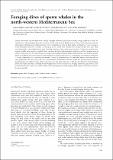Foraging dives of sperm whales in the north-western Mediterranean Sea
Date
12/2012Metadata
Show full item recordAbstract
Oceanic odontocetes rely on echolocation to forage on pelagic or benthic prey, but their feeding ecology is difficult to study. We studied sperm whale foraging dives during summer in the north-western Mediterranean, using visual and passive acoustic observations. Clicking and creaking activities were recorded during dives of focal whales, at distances <3000 m using a towed hydrophone and DAT recorder. A total of 52 sperm whales were recorded over at least one full dive cycle. Data were obtained for 156 complete dives in total, including sequences of up to nine consecutive dives. Various dive and environmental variables were entered in multiple linear regression and principal components analysis, as well as estimated mass of whales. Creak rate was 0.80 creak/minute on average, with moderate variance. Bigger whales tended to dive longer at greater depths (as suggested by ascent durations), and emitted more creaks during a dive: 20.2 creaks/dive on average for individuals <24 tons, compared to 25.6 creaks/dive for animals >24 tons of estimated mass. For individual whales, creak rates did not vary significantly with size (range 0.78–0.80 creak/minute), but decreased with time of the day, and increased for shorter foraging phases. For different dives, higher creak rates were also observed earlier in the day, and linked to shorter foraging phases and surface durations. Although the exact significance of creak emissions (i.e. foraging attempt or prey capture) is not precisely determined, creak rates may be reliably used to quantify sperm whale foraging when single animal dives can be followed acoustically.
Citation
Gannier , A , Petiau , E , Dulau , V & Rendell , L 2012 , ' Foraging dives of sperm whales in the north-western Mediterranean Sea ' , Journal of the Marine Biological Association of the United Kingdom , vol. 92 , no. Special Issue 08 , pp. 1799-1808 . https://doi.org/10.1017/S0025315412001087
Publication
Journal of the Marine Biological Association of the United Kingdom
Status
Peer reviewed
ISSN
0025-3154Type
Journal article
Collections
Items in the St Andrews Research Repository are protected by copyright, with all rights reserved, unless otherwise indicated.

